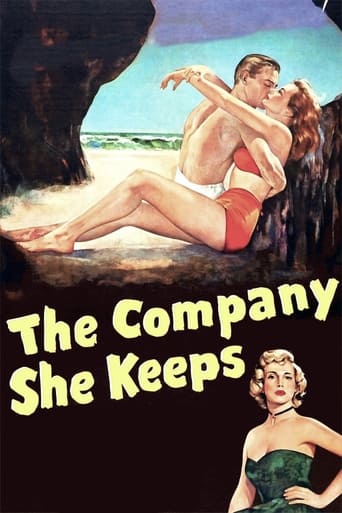JohnHowardReid
It seems incredible that any man would prefer dowdy Jane Greer to stylish Lizabeth Scott, yet that is precisely O'Keefe's choice in this oddly miscast movie! Miss Scott seems a natural for the parolee part and Miss Greer would not have disgraced the role of parole officer. Yet the casting director has reversed this natural order of succession! Director John Cromwell is below form too. Admittedly, he was not helped by the soap opera script, though he does display some occasional flashes of brilliance in such scenes as the brutal police line-up, and the sequence in which O'Keefe describes the things two can do on the town, illustrated by brief snippets of O'Keefe and Greer in the action. Production values are otherwise up to standard.Some critics complained that the plot and its characters were novelettish and that the movie never came to grips with its subject matter. But personally I feel that's what movies are all about. They're not documentaries about real life. They present characters with which audiences can identify in a fictional world which seems realistic enough to engage viewers' attention. My quarrel is that in this case neither the characters nor plot developments seem quite credible.
dougdoepke
Parole officer (Scott) and parolee Diane (Greer) compete for the same man (O'Keefe), creating conflict on several levels. At best, the movie's about the difficulties of being on parole.Oddball little programmer. Scott gets top billing, but as others point out, it's Greer who gets the screen time. And far from her usual slinky seductive role, she's not only de-glamorized, but also suitably dour-faced (just count her smiles; I stopped after one). All in all, it's a rather grim screenplay, drably photographed, and I can't believe the studio expected the final product to make money.Despite the romantic triangle that strains believability, there are several striking scenes. Catch the iconic 40's diner where Diane gets her bottom-of-the-barrel meals. The sweat and steam just about drip off the wall. And that police line-up-- a graphic cross-section of the city's tough cookies, down-and-out'ers, and hopelessly pathetic (& one of the few barfing scenes from that era)-- are all herded along by a bullying cop (Freed). It's one of the more unvarnished glimpses of urban flotsam and jetsam from the period. Then there's the crowded jail cell where the camera abandons Diane (& us) to a nightmare of entrapment. It's an unnerving moment, very well done. I would've liked the movie better had they made the triangle more credible, plus Scott's sacrificial character seems too good to be true. I expect the latter was RKO's effort at compensating for the harshness of the parole system as portrayed. Likely too, prestige producer John Houseman had something to do with the social realism phase, including the poignant overcoat episode. Anyway, reviewer bmacy's remarks on the influence of the previous year's Caged (1950) are on target. And, had this film carried through more with its realistic dimension, it might not be as obscure as it is.
Michael O'Keefe
Model prisoner Mildred Lynch(Jane Greer)receives an early parole from the State Prison for Women. She served her two years for forging checks and convinced the board of her changed ways. As part of her parole she must stay in contact with parole officer Joan Wilburn(Lizabeth Scott), who wants to befriend Mildred, who wants to start fresh with the changed name of Diane. Joan realizes the parolee has a chip on her shoulder and is very paranoid. None the less, Diane finds an apartment and a job at the hospital on the night shift. She meets a handsome hospital visitor, reporter Larry Collins(Dennis O'Keefe)and practically forces him to fall in love with her. There is a problem here with the fact that Larry is already in a relationship with Joan...yes, Diane's parole officer. Diane manages to hide the facts from Larry that she has been in prison and that she knows he and Joan have history. Scott and Greer are notable in their roles. Other players include: Fay Baker, Don Bledsoe, Bert Freed, and Irene Tedrow.
wrbtu
Lizabeth Scott is OK here, & I'm a big fan of hers, but I would have liked her better in the role of Diane (played by Greer). Scott is just too sugary sweet in her role as a Parole Officer Angel. On the other hand, I kept waiting for Greer's character to wake up & smell the coffee, but she really never did, & that's what makes this film a cut above similar soapers of this kind. Greer is excellent as a sneering, eye-rolling bad girl who just doesn't care about those trying to help her or society, & really doesn't even care about herself. I rate it 6/10. I would have rated it higher if not for Scott's too sweet character & the happy pat en


